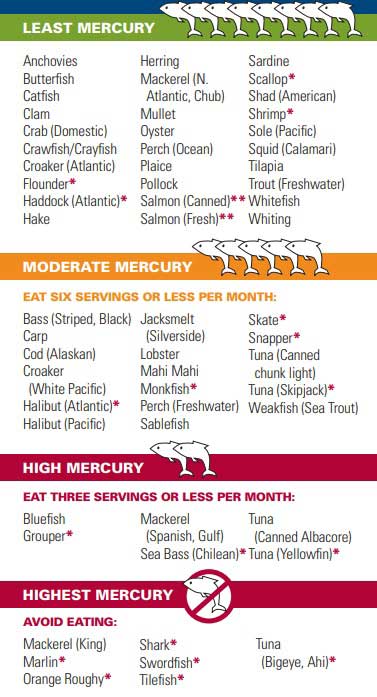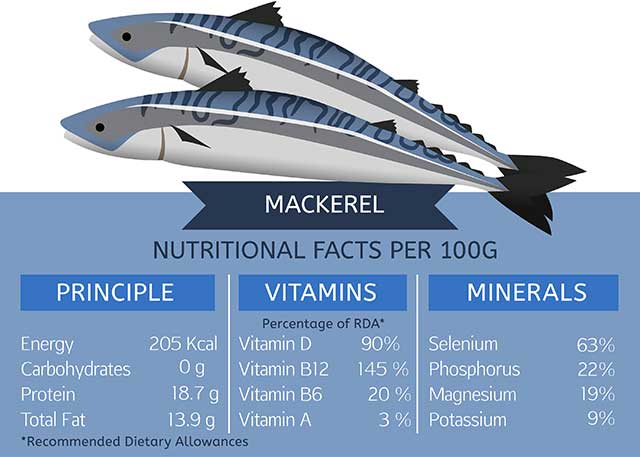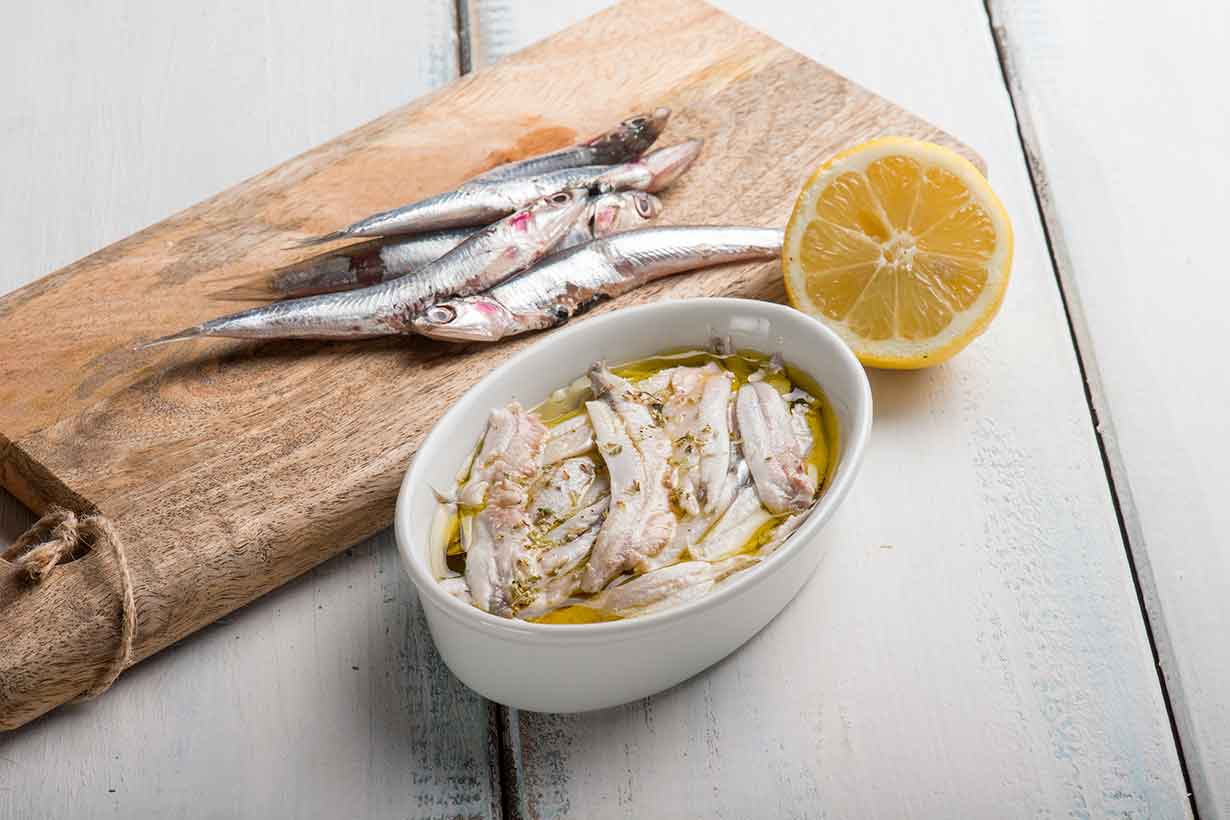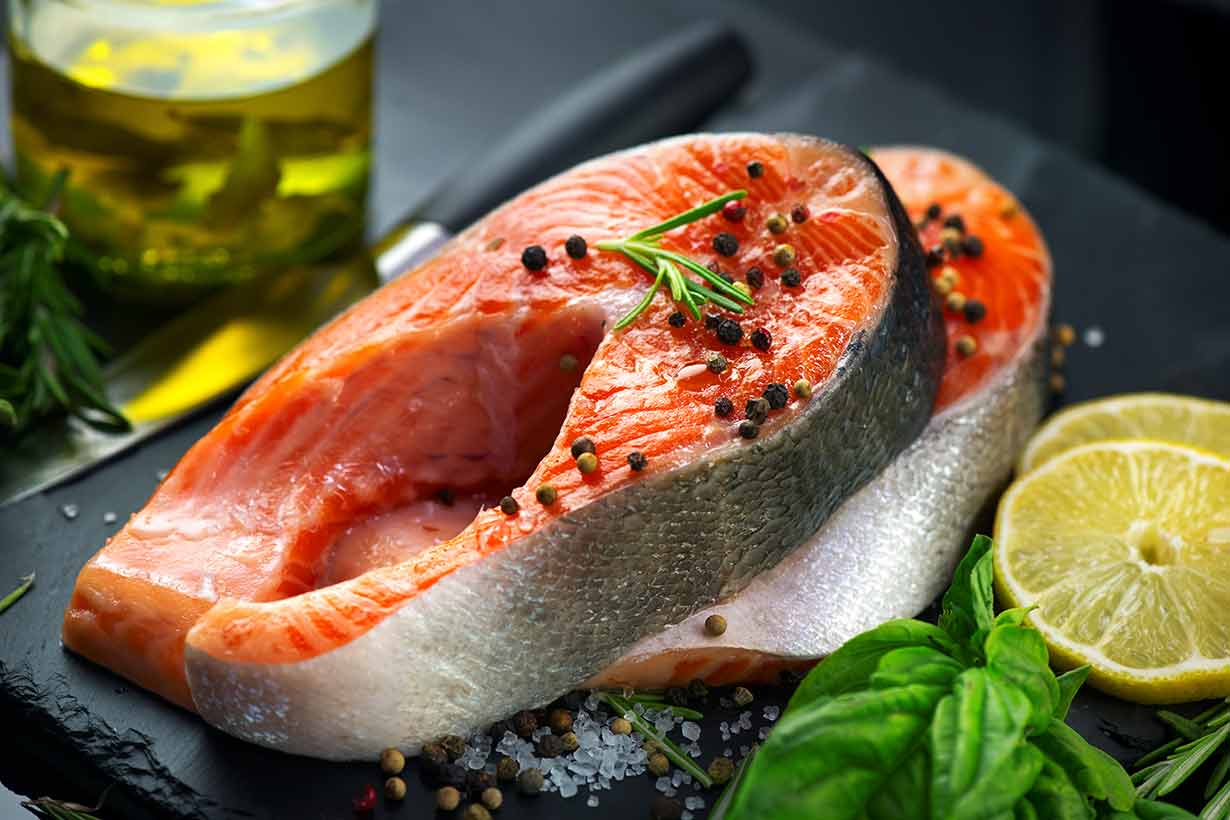Mackerel is full of omega-3 fatty acids and contains a wealth of essential vitamins and minerals.
In short, this oily fish is one of the healthiest seafood options available.
This article examines nine potential benefits of mackerel alongside the full nutritional profile of the fish.
1) Mackerel Is a Substantial Source of Omega-3 Fatty Acids

It is a fact that most adults are not consuming enough omega-3 (1).
For example, aside from people living in East Asia and Scandinavia, most adults around the world have low blood levels of these essential fats (2).
The best way to increase our omega-3 intake is by consuming more oily fish rich in these essential fats.
On the positive side, mackerel offers a substantial amount of omega-3, and just one fillet provides 2991 mg of the fatty acids. Per 100 grams, this equates to 2670 mg of omega-3 (3).
Notably, this is more omega-3 than the majority of other oily fish provide, and mackerel is a very affordable fish too.
The Importance of Omega-3
Omega-3 fatty acids have an extensive range of health benefits, and they have anti-inflammatory mechanisms within the body.
Amongst other benefits, increasing our omega-3 intake may improve cardiovascular and health (4).
Additionally, studies demonstrate that higher plasma levels of omega-3 results in a lower risk of cardiovascular and all-cause mortality (5, 6, 7).
For another fish high in omega-3, see this guide to salmon.
2) Mackerel Contains Significant Amounts of Vitamin B12
Unfortunately, vitamin B12 deficiency affects an estimated 6% of the UK and USA’s population, and this figure increases to 20% in the over-60 age group (8).
Vitamin B12 is one of the most crucial nutrients for our health, and a deficiency can potentially cause anemia and also damage our nervous system (9, 10).
For these reasons, it is vital to ensure a sufficient intake of the vitamin regardless of dietary preference.
Fortunately, mackerel contains a significant amount of this essential vitamin, and a cooked mackerel fillet provides 279% of the RDI for B12 (11).
Vitamin B12 is essential for our immune and nervous systems, and it also plays a role in producing DNA (12, 13).
3) Rich In Protein

Mackerel is an excellent source of dietary protein, and a regular fillet of mackerel offers 20.8 grams of protein (14).
Additionally, mackerel is a complete source of protein, which means the fish includes sufficient quantities of all nine essential amino acids (15).
Since mackerel is a relatively fatty fish, it does not offer as much protein as leaner fish choices such as cod and haddock can.
However, getting high-quality protein alongside omega-3 fatty acids is a great health benefit of mackerel.
That said, as an oily fish, mackerel contains more calories than leaner protein options, so if protein density is a goal, then leaner fish like haddock might be worth looking into.
4) Mackerel Contains Very Low Levels of Mercury
Although seafood is generally nutritious and beneficial for our body, one negative point is that it can be affected by mercury contamination.
For instance, health authorities claim that we should only eat certain fish on rare occasions, due to the amount of mercury it contains.
The image below, from the Natural Resources Defense Council, shows that we should only eat albacore tuna and swordfish on rare occasions.

However, you will notice that Atlantic mackerel is one of the fish in the ‘least mercury’ section.
It is important to note that this refers to Atlantic mackerel.
Other species of the fish, such as Spanish and King mackerel, are relatively high in mercury.
For reference, the table below shows the mean mercury contamination of some common species of fish (16);
| Fish Species | Mean Mercury Contamination (PPM) |
| Cod | 0.111 |
| Herring | 0.078 |
| Mackerel (Atlantic) | 0.05 |
| Sardines | 0.013 |
| Tuna (Albacore) | 0.358 |
Among these common types of fish, mackerel contains the second lowest level of mercury behind sardines.
5) An Excellent Source of Selenium
Another health benefit of mackerel is that just one small fillet provides 71% of the recommended dietary intake for selenium (3).
Selenium is an essential mineral that has numerous important functions in our body, and these include (17);
- Antioxidant function: selenoenzymes and selenoproteins may help to attenuate oxidative stress.
- Plays a key role in the health of our immune system.
- DNA production.
- Regulates thyroid hormones and overall thyroid health.
Furthermore, a systematic review of randomized controlled trials suggests that higher selenium intake may lower several risk factors for cardiovascular disease by (18);
- Decreasing markers of inflammation
- Increasing levels of glutathione, known as ‘the body’s master antioxidant’
Interestingly, selenium is also known to bind mercury. While this topic is not currently fully understood, it may potentially make the minimal mercury levels in mackerel less of an issue.
6) May Improve Cardiovascular Health

As previously mentioned, both omega-3 and selenium may help to improve cardiovascular health.
However, mackerel is a rich source of many vitamins and minerals that are associated with better heart health, such as magnesium, potassium, and zinc (19, 20, 21).
Further to this, specific studies have analyzed the impact of fatty fish such as mackerel on cardiovascular disease (CVD) risk factors;
- Fatty fish consumption improves CVD risk by lowering inflammation and improving vascular function (22).
- In a meta-analysis of existing studies on fish consumption, each incremental increase of 20 grams of fish daily was associated with a 7% reduction in cardiovascular mortality. Although we cannot prove causation from this, it does support the known benefits of consuming fish (23).
- In a randomized controlled trial, consuming 750 grams of fatty fish per week, such as mackerel, led to lower blood-glucose responses to meals. Additionally, blood levels of omega-3 increased in the 68 trial participants. In contrast, 750 grams of lean fish did not have these effects (24).
7) Mackerel Offers 100% of the RDI For Vitamin D
Vitamin D deficiency is a significant problem in the developed world, particularly for nations with long and dark winters.
Since most of us spend the majority of our time inside, there are limited opportunities to get vitamin D from natural sunlight too.
Aside from supplementation, some foods are naturally high in vitamin D, and mackerel is one of those foods.
In fact, one regular mackerel fillet provides more than 100% of the recommended dietary intake for vitamin D (3).
It would be more accurate to call vitamin D a hormone rather than a vitamin, and ensuring a sufficient blood level of this hormone is crucial for good health (25).
For instance, vitamin D has numerous powerful effects within the body, and research demonstrates that it can display anti-cancer and anti-inflammatory actions (26).
Generally speaking, we can mainly find vitamin D in oily fish and organ meats, and mackerel is one of the very best sources.
8) May Improve Cognitive Function

Cognitive function refers to how well we can perform mental activities and process information.
Although a lot of our cognitive ability is nature, various foods and drinks can have a positive (or detrimental) effect on cognition. On the positive side, mackerel appears to support a healthy mental state, and evidence shows the fish can boost cognitive function.
In a recent randomized controlled trial, 232 children from 13 kindergartens were assigned to consume one of the following food options three days a week for 16 weeks (27);
- Group 1: Herring or mackerel
- Group 2: Beef, lamb or pork
To ensure the study was fair, the fish and meat were identical in weight.
After 16 weeks, the group eating herring or mackerel had a significantly increased blood level of omega-3 fatty acids.
Additionally, when adjusting for compliance with the diet, the students in the fish group showed higher improvements in cognitive score compared to the meat group.
What Causes These Cognitive Benefits?
Researchers believe that these cognitive improvements from eating fish come from the omega-3 fatty acid docosahexaenoic acid (DHA).
Numerous further trials demonstrate that consuming oily fish such as mackerel is beneficial for cognition throughout the lifespan, and particularly in the elderly (28, 29).
9) Mackerel Can Help To Reduce Triglyceride Levels
Triglycerides are one of the most significant cardiovascular risk factors.
Research consistently shows that high triglyceride levels are a risk factor for cardiovascular disease and cardiovascular events (30, 31).
Firstly, many different factors can increase (or decrease) triglyceride levels, including exercise, food, and sleep.
However, oily fish such as mackerel has been shown to help reduce triglycerides in numerous trials.
Several of these trials specifically used a “mackerel diet” to beneficially alter the lipid profile of adult patients. In these trials, daily mackerel intake significantly decreased triglyceride levels in both the short and long-term (32, 33, 34).
These results support the current understanding that DHA/EPA can consistently—and significantly—lower triglyceride concentrations, as shown in systematic reviews (35, 36).
Nutrition Facts (per 100 grams)

Now that we have examined the health benefits of mackerel, let’s take a look at the full nutrition profile for this oily fish per 100 grams (3).
The tables below show the calories, macronutrient, and macronutrient data for the fish.
Calories and Macros
| Nutrient | Amount (kcal/grams) |
| Calories | 205 kcal |
| Carbohydrate | 0 g |
| Fat | 13.9 g |
| Saturated Fat | 3.3 g |
| Monounsaturated Fat | 5.5 g |
| Polyunsaturated Fat | 3.3 g |
| Omega-3 Fatty Acids | 2670 mg |
| Omega-6 Fatty Acids | 219 mg |
| Protein | 18.6 g |
As shown, mackerel contains 205 calories per 100 grams, and most of these come from the fat content.
Mackerel is also an excellent source of protein and contains no dietary carbohydrate.
Vitamins
| Vitamin | Amount (% DV) |
| Vitamin B12 | 145 % |
| Vitamin D | 90 % |
| Vitamin B3 | 45 % |
| Vitamin B2 | 18 % |
| Vitamin B1 | 12 % |
| Vitamin B5 | 9 % |
| Vitamin E | 8 % |
| Vitamin K | 6 % |
| Vitamin A | 3 % |
Mackerel provides a wide range of vitamins, and it is a particularly significant source of vitamin B 12 and vitamin D.
Minerals
| Mineral | Amount (% DV) |
| Selenium | 63 % |
| Phosphorus | 22 % |
| Magnesium | 19 % |
| Iron | 9 % |
| Potassium | 9 % |
| Copper | 4 % |
| Sodium | 4 % |
| Zinc | 4 % |
| Calcium | 1 % |
| Manganese | 1 % |
Mackerel contains a variety of minerals, with especially large concentrations of magnesium, phosphorus, and selenium.
Final Thoughts
Overall, there are many things to like about mackerel.
This oily fish provides a substantial source of omega-3 fatty acids, it is protein-rich, and it contains a wide range of beneficial vitamins and minerals.
There is also the bonus that mackerel is a reasonably cheap source of nutrients.
Including this healthy fish in our diet may offer many health benefits, particularly those related to increased omega-3 consumption.
For another excellent oily fish option, see this guide to traditional kippers.








